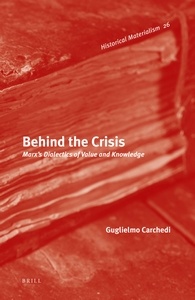Guglielmo Carchedi
Much has been written since Capital was first published, and more recently after the demise of the Soviet Union and the consequent triumph of neoliberalism, about the irrelevance, inconsistency, and obsoleteness of Marx. This has been attributed to his unworkable method of inquiry. This book goes against the current. It introduces the issues that are presently most hotly debated, it evaluates them, and it groups them into four headings, each one of them corresponding to a chapter. At the same time, it submits a new reading of Marx’s method of social research and on this basis it argues that Marx’s work offers a solid foundation upon which to further develop a multi-faceted theory of crises highly relevant for the contemporary world.
Biographical note
Readership
Reviews
Marco Boffo, University of London (Marx & Philosophy, 2011)
Table of contents
1. Method
1.The need for dialectics
2. Dialectical logic and social phenomena
3. The dialectics of individual and social phenomena
4. Class-analysis and the sociology of non-equilibrium
5. A dialectics of nature?
6. Formal logic and dialectical logic
7. Induction, deduction and verification
2. Debates
1. Recasting the issues
2. Abstract labour as the only source of surplus-value
3. The materiality of abstract labour
4. The tendential fall in the average rate of profit
5. The transformation ‘problem’
6. The alien rationality of homo economicus
3. Crises
1. Alternative explanations
2. The cyclical movement
3. The subprime debacle
4. Either Marx or Keynes
4. Subjectivity
1. Crisis-theory and theory of knowledge
2. Neither information-society nor service-society
3. Individual knowledge
4. Social knowledge
5. Labour’s knowledge
6.Knowledge and value
7. The general intellect
8. Science, techniques and alien knowledge
9.Trans-epochal and trans-class knowledge
10. Knowledge and transition
Appendix 1. The Building Blocks of Society
Appendix 2. Objective and Mental Labour-Processes
Appendix 3. Marx’s Mathematical Manuscripts
References
Index

